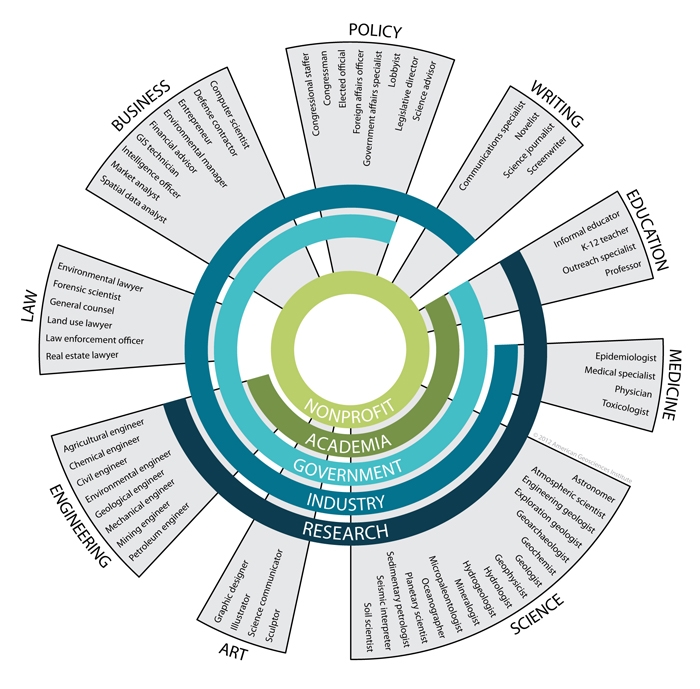Post Graduation Resources
Careers in the Geosciences
General Career || Recent Graduates || Job Application || Graduate School || Article links
The Colorado College Career Center help students and alumni find and apply for jobs. Individuals may schedule an appointment with them over Handshake.
Examples of Possible jobs after receiving a Geology degree from Colorado College
|
|
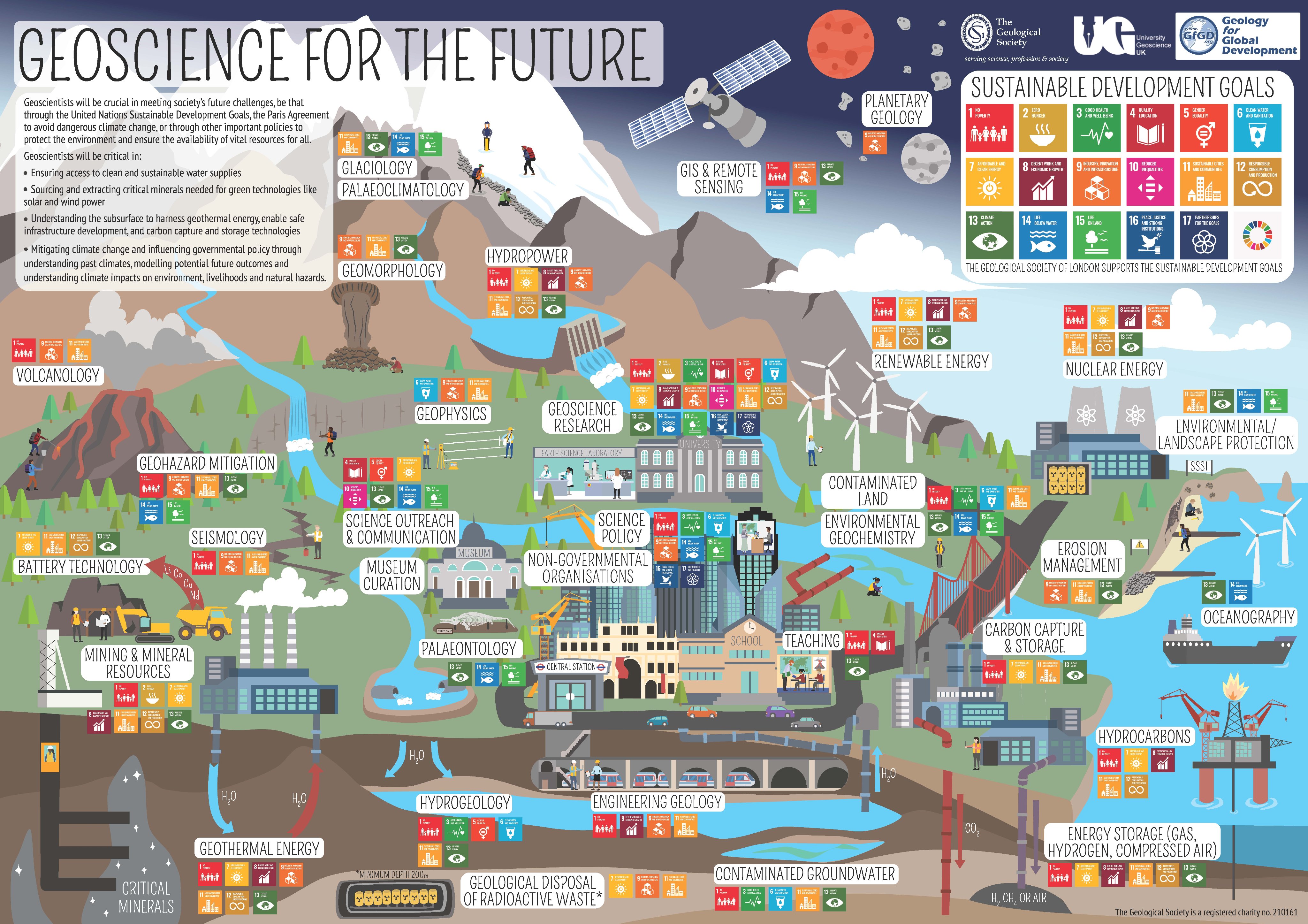
SACNAS - aimed towards Chicanos/Hispanics & Native Americans in science
AMS Jobs Board - Meteorology
Geotemps - Temp jobs in mining
General job posting websites
Try to apply directly through the company's website
Geoscience Job Email LISTSERV
GSA GeoCareers - subscribe to the Geocareers email list & browse the links for helpful tips on how to set yourself up for a successful career in the geosciences
The Gilbert club - mostly academic, Geomorphology focused email list
Professional Development Groups
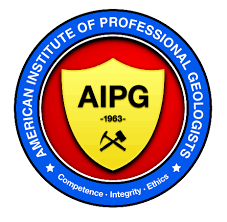 |
American Institute for Professional Geologists |
Reach out the heads of the Colorado College chapter! |
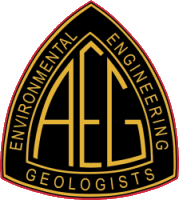 |
Association for Environmental and Engineering Geologists |
|
 |
Association for Women Geoscientists |
|
Industry Job Resources for Recent Graduates
Are you wondering about how do you break into "the industry"? What kind of types of geoscience jobs make up "the industry"? And are there specific internships or positions dedicated to recent graduates? What jobs hire for people with a bachelors? This section will start to address these questions and give you some tips on how to apply and possible certifications.
Skills and experience are more important than level of education in most Industry jobs, so Internships can be really helpful. Look for jobs that use "Entry Level," "Jr," or "Graduate" in the titles, since these opportunities are usually designed for people just out of school with lower levels of experience. Unlike academic positions or internships, industry jobs tend to hire 2-3 weeks out.
Internships
BBA Water Consultants, Inc. offer a summer internship that accepts current students and recent graduates
Witter Internships are available right after a student graduates.
Recent Graduate Government Program: 1 year position working for the US government that you can qualify for up to 2 years after graduation.
Scientists in the Park: 12-week (mostly) summer internships offered in National Parks all around the US
Science Undergraduate Laboratory Internships (SULI): 10 week summer internship (May-August), 16 week Spring (Jan-May) and Fall (Aug - Dec) provides research experience at the Department of Energy (DOE) labs. Individuals who graduated less than 2-years ago, GPA 3.0-4.0, and Permanent Resident, are eligible
Entry-Level Work
Environmental Consulting is a broad title for geoscientists that can be field/modeling/GIS based or a mix of all three! This job collects environmental data for private or government companies.
Engineering Geologists communicate geologic observations and concepts to engineers to avoid building hazards. Learning/being certified in the Unified Soil Classification System (USCS) is a huge leg up.
Hydrologist or Hydrologist Assistants work surface and groundwater processes.
Conservation is a broad category, but often includes field work at entry-level, though this would vary depending on your location and role in the company. e.g. soil conservationist, biological conservationist, wetland conservationist
Temporary/Seasonal
GIS temporary/seasonal positions offer experience in an ever-growing industry
Field Technicians operate and deal with field equipment. Usually almost all field work, and often seasonal or project-based.
Mud-Logging/Wellsite geologist has high turnover, you start working night shifts, it provides the ability for quick promotion. Project last 2-3 weeks then you can opt for a week or so off.
Outdoor Recreation jobs (hiking guide, fly fishing guide, ski guide, chair lift operator 'lifty', raft guide,) can be a great option right out of college to explore the outdoors, meet cool people, and figure out what you want to do long-term. Navigation and map reading skills, field experience, and team-building gained in Geology will help you get these jobs.
Applying for Jobs
This section will answer: What is the difference between a resume vs CV, references vs. Letter of Recommendation? How do I write a good resume and cover letter? What are certain certifications jobs are asking for and how do I obtain them?
Resume vs. CV
Resume
- A document that emphasizes skills suited to the job
- Used when applying for a position in industry, non-profit, and public sectors
- Usually fits on 1 page and no longer than 2 pages
- you can include an additional page for publications and/or poster presentations if highly relevant to the job
- After 1 year of industry experience, lead with work experience and place education section at or near the end, depending upon qualifications.
Curriculum Vitae (CV)
- Emphasizes academic accomplishments
- Primarily used when applying for positions in academia, fellowships and grants
- No length restrictions because it includes a complete list of publications, posters, and presentations
- More experience means your CV will be longer
- Education always comes first, and you can add more details about thesis/research project summaries, advisor names, etc.
References vs. Letter of Recommendation
References
- A list of names and contact info (email, phone number) of people who have agreed to corroborate skills, attributes, and experience from your application
- The hiring committee will contact these individuals to ask about your work ethic, disposition, abilities, and anything that may give them insight into if you'll be a good fit for the role
- Ask current or former supervisors, coaches, teachers/professors, and occasionally friends could serve as character references.
- Jobs Standardly ask for 2-3 references, including your current supervisor/manager/boss
Letter of Recommendation
- A formal letter written by an individual who you have worked closely with who can attest to your abilities, personality, and work ethic. Usually a professor
- The application will ask for one if it is required! Usually for academic applications: Graduate school program, scholarships, study abroad programs, etc.
- Choose and ask the individual you would like to write the letter AT LEAST 2 weeks in advance of the due date (the more ahead of time the better)
- More information in Graduate School section
Source: https://career.uconn.edu/
Writing a good resume & cover letter
Colorado College Career Center is great for help in crafting and editing resumes and cover letters, especially for a specific job posts
Based on feedback from geoscience consulting firms around Seattle, here are examples of desirable cover letters and resumes, objective statements for the resume, and notes on job search tips
You will want to taylor your resume and cover letter to the job application:
- Identify key words from the application (i.e. detail oriented, independant, experience with water testing...)
- Include those key words in both resume and cover letter
A good cover letter should not only demostrate how you are a good fit for the job, but that you understand and would fit in with the company's overall goals and culture. While a cover letter template is a good idea, most experts say that you should be re-writing significant portions of your cover letter with each new application.
- How to Write a cover letter - Harvard Business Review
- Your Complete Guide to Writing a cover letter (Plus Bonus Tips and Examples) - The Muse
Reach out to AIPG Colorado Chapter members for resume and cover letter review
What are the professional certifications I need?
Professional Geology License: National Association of State Boards of Geology (ASBOG)
Some states require ASBOG (Colorado does not) but here is a list of states that do. If you want to look into taking the fundamentals exam, start looking at study material and reach out to Prof Sarah Schanz who took this exam after her undergrad.
Licenses are administered by the state and only apply to that state. There are two parts to this test: fundamentals exam (FG) and the practical exam (PG). It's a good idea to study and take the FG soon after leaving school when you retain a more general knowledge of geology, before branching off into a specific field. Licensing is state-by-state so having the full license before having a job limits locations that your license is applicable, BUT the FG test is the same all over the US so taking that soon after undergrad is highly encouraged.
Those who pass the FG are granted Geologist in Training (GIT) status.
OSHA Certifications
Unlike ASBOG, the company hiring you expect to pay for these. Occupational Safety and Health Administration (OSHA) certifications are often listed as requirements or desired in job applications but do not hinder you from being hired. The types of OSHA certification requirements are very company & job specific.
OSHA's Hazardous Waste and Emergency Response standard (HAZWOPER) - 40,30, and 8 hour online tests for individuals working with/around hazardous waste material.
OSHA-30 is a 30 hour online course, that covers electronic safety to fall hazards, usually for construction sites.
Apply for Graduate School
Detailed Steps on Prof Sarah Schanz's website
AIPG pamphlet available in Mandy's Office
Masters (MS) or Doctorate (PhD)?
Different jobs require different level of degrees and a PhD may be a larger time commitment than needed for your ideal job.
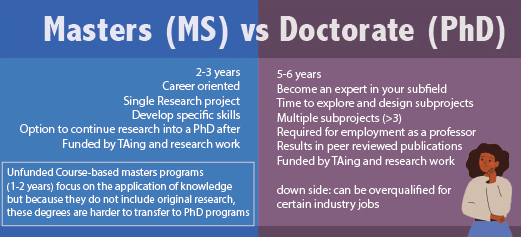
Start Early - A Year Before Attendance
The process of applying to graduate school takes just over a year. Start researching advisors and institutions during the summer. Reach out to CC faculty about the type of research you want to do and which professors are known as good advisors.
Reach out to potential advisors via email by early September at the latest.
Fall - Applying to schools
Testing - GRE
The Graduate Record Examinations (GRE) is a standardized test that many graduate program application require. Many institutions no longer require the GRE - To figure out if the program requires the GRE, first comb the institution's website, then ask your potential advisor.
List of Schools that no longer require the GRE
The Graduate Research Fellowship Program (GRFP) - GRFP website
The GRFP is a three year fellowship provides financial support for research outside of your advisor's research grants. An individual can apply once as an undergrad and once as a graduate student.
Applications due mid-October
Request Letters of Recommendation
Letters of recommendation are requested by by the university, who provides a submission link directly to the recommender. They are written by professors or employer about how you are as a students, researcher, and/or worker.
Ask professors for letters of recommendation at least 3 weeks before they are due.
Personal Statement - How to write a personal statement
A personal statement is an important part of the graduate school application because it is the first thing the admission board sees. This is a place to highlight reasons why you would be a good fit for their program.
Your application will consist of your CV + Personal Statement, Transcript, GRE test scores (depending on the university), and Letters of Recommendation (sent by recommender).
Winter - Visiting schools
If you are accepted, most schools will pay for you to visit them during an Open House, where you have the opportunity to talk to your potential advisor, their graduate students, and potential collaborators. This is also a good chance to get to know the city or region you would be living in. Some questions to consider at these visits:
- How do the current graduate students like working with their advisor?
- What is the funding or project you would be involved in? How much ownership will you have of the project?
- What are the opportunities for external training, like data science, teaching, etc if you are interested in those?
- What are the research group dynamics?
- Could you see yourself living in this region/city for 3-6 years?
Paying for Graduate School
STEM degrees are paid for by employment through the university - either being a teaching assistant or researching assistant. You should not need to pay money to attend a research-based STEM graduate program.
Links to Articles
Career Advice Articles
Non-Traditional Careers for Women
21+ Essential LinkedIn Profile Tips For Job-Seekers [For 2025]
Foreign Nationals Article Resources
How to Work in the US as a Foreigner After Graduation
How to Find a Job in the US for Foreign Nationals
Working in the US (government page)
Data Science & Tech
A Guide for Women to Break into Information Technology
Non-Profit
U.S. PIRG Jobs & Opportunities


